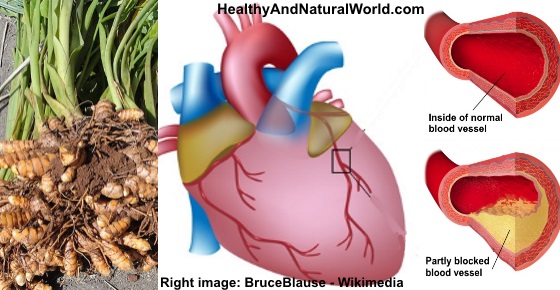Why Turmeric Can be Effective as an Hour of Exercise

Turmeric is a kitchen ingredient that goes well beyond being a tasty spice. The benefits of eating turmeric on a regular basis are well-documented. As one of nature’s antibiotics, it can help with healing wounds and staving off infection, keeping Alzheimer’s disease at bay, and even combating certain types of cancer.
Turmeric is a spice that all who love Indian food are familiar with, as it is a main ingredient in many types of curried dishes—and recent research has shown that we can add yet another benefit to the long list boasted by turmeric: being as good for cardiovascular health as physical exercise!
Curcumin is the “Magical” Ingredient
Curcumin is a compound found in turmeric that has recently gained a lot of exposure in scientific research journals for its noteworthy effects on human health problems, ranging from cancer to diabetes and heart health issues. Turmeric is one of the top 14 foods that protects against cancer development.
While Ayurvedic medicine in India has long touted the many health benefits of turmeric, modern science is finally catching up to what Ayurveda has been saying for millennia.
Important point: studies have revealed that turmeric has low absorption in your body unless you combine it with certain foods. I have more details about it at the end of this article so make sure you read that section.
Turmeric Has Tremendous Cardiovascular Benefits
A study published in Nutrition Research1 have reached an astonishing conclusion: eating turmeric or taking turmeric supplements is just as effective in the battle for heart health as getting in aerobic exercise—such as an hour of jogging or brisk walking.
These effects were particularly noteworthy in women of a menopausal age, for whom heart health can become a real concern.
Study details
The 8-week long study involved 32 postmenopausal women who were assigned into 3 groups:
- A non-treatment control
- Exercise
- Curcumin
Subjects in the curcumin group received 150 mg turmeric extract per day, for 8 weeks, supplying 25 mg of curcumin. Their diet and exercise habits were unchanged during the study period.
Subjects in the exercise group underwent aerobic exercise training more than 3 days per week (2-3 supervised sessions and additional home-based training).
Over the course of the 8 week exercise program involving cycling and walking, they engaged in between 30-60 minute long sessions, ranging in intensity from 60% of their individually determined maximal heart rate in the initial phase of the trial, to 70-75% maximal heart rate in the latter half.
The results of the study
The endothelial cells which line the interior surface of blood vessels of the study participants were observed, and researchers noted that the function of these cells showed notable improvement after two months in both curcumin and exercise groups, compared to the control.
Dysfunction of endothelial cells is a major contributing factor to the development of atherosclerosis (fat deposits within the blood vessels, akin to clogged pipes), so anything which can prevent endothelial cells from becoming dysfunctional can also help ward off this form of heart disease.
The researchers concluded: “The present study showed that regular ingestion of curcumin or regular aerobic exercise training significantly improved endothelial function. The magnitude of improvement in endothelial function to the same extent, suggesting that curcumin may prevent the age-associated decline in endothelial function in postmenopausal women.”
Turmeric Consumption for Cardiovascular Health – How Much to Consume
Study participants showed improvements in cardiovascular function after just eight weeks of taking 150 milligrams of turmeric extract daily, which made for a total of 25 milligrams of curcumin per dose. You need to pay attention that the study participants receive a turmeric extract which contains high dosage of the magical ingredient curcumin.
The curcumin content in regular turmeric powder is not that high, approximately 2%, so you will need to take about a tablespoon of turmeric to enjoy the same health benefits, or you can purchase turmeric extract capsules.
Turmeric capsules can be found online or in health food stores or drug store shelves, or you can drink golden milk (use this golden milk recipe) or add turmeric to this anti inflammatory tea or to the top of savory food dishes to reap these rewards for yourself. Another option is to use turmeric to make an anti inflammatory turmeric dressing.
How to Consume turmeric for Better Absorption
While turmeric is a powerful and effective compound for treating a wide range of diseases, studies have revealed that turmeric has low absorption and rapid metabolism that lead to relatively low bioavailability in the body.
You need to combine your turmeric consumption with consumption of other foods to make sure your body will absorb it. You can get the complete information in my article on how to optimize turmeric absorption to maximize its health benefits.
Anti-inflammatory Turmeric Smoothie Recipe
- 1 cup of pineapple chunks (optional)
- 2 oranges, peeled
- One inch of fresh ginger root (or 1/2 tsp. of ground ginger)
- One inch of fresh turmeric root (or 1/2 tsp. of ground turmeric)
- 3 large carrots
- A pinch of black pepper
- ½ teaspoons of virgin coconut oil
Place all the ingredients in a blender and blend at high speed. You can drink it immediately or make a larger amount and store in a glass jar in the refrigerator.
Read my other related articles:
- How Cooking and Heat Affect Turmeric and Black Pepper
- Turmeric Extract is Effective as Ibuprofen for Knee Osteoarthritis
- Turmeric May Be the Natural Alternative To Depression Medications
